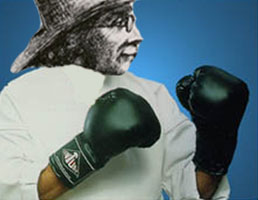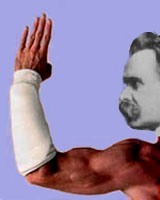

KIERKEGAARD VS. NIETZSCHE


K: "If only the abstract idea of despair is considered, without any thought of someone in despair, it must be regarded as a surpassing excellence. The possibility of this sickness is man's superiority over the animal, and this superiority distinguishes him in quite another way than does his erect walk, for it indicates infinite erectness or sublimity, that he is spirit." - Part One, A, pp. 14-15Underlying Causes:
N: "Man is by no means the crown of creation: every living being stands beside him on the same level of perfection. And even this is saying too much: relatively speaking, man is the most bungled of all the animals, the sickliest, and not one has strayed more dangerously from its instincts." - The Antichrist 14, p. 580
K: "Eternity asks you and every individual in these millions and millions only one thing: whether you have lived in despair or not, whether you have despaired in such a way that you did not realize that you were in despair, or in such a way that you covertly carried this sickness inside of you as your gnawing secret... or in such a way that you, a terror to others, raged in despair." - Part One, B, p. 27Fatalism:
N: "There are days when I am afflicted with a feeling blacker than the blackest melancholy -- contempt of man. And to leave no doubt concerning what I despise, who I despise: it is the man of today... I suffocate from his unclean breath." - The Antichrist 38, pp. 610-611
"I condemn Christianity. I raise against the Christian church the most terrible of all accusations that any accuser ever uttered... This eternal indictment of Christianity I will write on all walls, wherever there are walls -- I have letters to make even the blind see." - The Antichrist 62, pp. 655-656
K: "The determinist, the fatalist, is in despair and as one in despair has lost his self, because for him everything has become necessity.... The self of the determinist cannot breathe, for it is impossible to breathe necessity exclusively, because that would utterly suffocate a person's self." - Part One, C, p. 40Example Fulfilled:
N: "Formerly man was given a 'free will' as his dowry from a higher order: today we have taken his will away altogether... the old word 'will' now serves only to denote a resultant, a kind of individual reaction, which follows necessarily upon a number of partly contradictory, partly harmonious stimuli: the will no longer 'acts' or 'moves.'" - The Antichrist 14, pp. 580-581
K: "For example, if a man is presumably happy... although considered in the light of truth he is unhappy, he is usually far from wanting to be wrenched out of his error. On the contrary, he becomes indignant, he regards anyone who does so as his worst enemy... Why? Because he is completely dominated by the sensate and the sensate-psychical, because he lives in sensate categories, the pleasant and the unpleasant, waves goodbye to spirit, truth, etc., because he is too sensate to have the courage to venture out and to endure being spirit." - Part One, C, p. 43In Despair to Will to Be Oneself... Defiance:
N: "The noble scorn of a Roman [Pilate], confronted with an impudent abuse of the word 'truth,' has enriched the New Testament with the only saying that has value -- one which is its criticism, even its annihilation: 'What is truth?' (John 18:38)" - The Antichrist 46, pp. 626-627
K: "With the help of this infinite form, the self in despair wants to be master of itself or to create itself, to make his self into the self he wants to be, to determine what he will have or not have in his concrete self." - Part One, C, p. 68Who is Nietzsche?:
N: "We, however, want to become those we are -- human beings who are new, unique, incomparable, who give themselves laws, who create themselves." - The Gay Science, Book Four, 335, p. 266 (So I borrowed from another book! So what!)
Footnote:
"For even if this self does not go so far into despair that it becomes an imaginatively constructed god -- no derived self can give itself more than it is in itself by paying attention to itself -- it remains itself from first to last; in its self-redoubling it becomes neither more nor less than itself." - Part One, C, p. 69
I.e., you cannot create an ubermensch
K: "Once he would gladly have given everything to be rid of this agony, but he was kept in waiting; now it is too late, now he would rather rage against everything and be the wronged victim of the whole world and of all life, and it is of particular significance to him to make sure that he has his torment on hand and that no one takes it away from him... What demonic madness -- the thought that most infuriates him is that eternity could get the notion to deprive him of his misery." - Part One, C, p. 72Bibliography:
"...In hatred toward existence it [this demonic self] wills to be itself, wills to be itself in accordance with its misery. Not even in defiance or defiantly does it will to be itself, but for spite; not even in defiance does it want to tear itself loose from the power that established it, but for spite wants to force itself upon it... Rebelling against all existence, it feels that it has obtained evidence against it, against its goodness. The person in despair believes that he himself is the evidence, and that is what he wants to be, and therefore he wants to be himself, himself in his torment, in order to protest against all existence with this torment. Just as the weak, despairing person is unwilling to hear anything about any consolation eternity has for him, so a person in such despair does not want to hear anything about it, either, but for a different reason: this very consolation would be his undoing -- as a denunciation of all existence." - Part One, C, p. 73
N: "The concept of guilt and punishment, including the doctrine of grace, of redemption, of forgiveness -- lies through and through... A vampirism of pale, subterranean bloodsuckers!" - The Antichrist 49, p. 630
"This stealthy vermin which sneaked up to every single on in the night, in fog and ambiguity, and sucked out of each single one the seriousness for true things and any instinct for realities... [Rome was] not buried overnight by a natural catastrophe, not trampled down by Teutons and other buffaloes, but ruined by cunning, stealthy, invisible, anemic vampires." - The Antichrist 58,59, pp.648-649, 651
 Go to Round 2! Works of Love vs. Twilight of the Idols
Go to Round 2! Works of Love vs. Twilight of the Idols